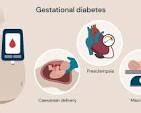Navigating Gestational Diabetes: A Guide for Expectant Mothers
by twib

The Lowdown on Gestational Diabetes
Gestational diabetes is a type of diabetes that develops during pregnancy. It occurs when the body is unable to produce enough insulin to meet the extra needs of pregnancy. This condition can lead to high blood sugar levels, which can be harmful to both the mother and the baby if not properly managed.
Causes and Risk Factors
While the exact cause of gestational diabetes is not fully understood, certain factors can increase a woman’s risk of developing this condition. These include being overweight, having a family history of diabetes, being older than 25 when pregnant, and having previously given birth to a large baby weighing over 4.5 kilograms.
Symptoms and Diagnosis
Many women with gestational diabetes do not experience any noticeable symptoms. That’s why it’s essential for pregnant women to undergo screening tests for gestational diabetes between 24 and 28 weeks of pregnancy. These tests typically involve measuring blood sugar levels after fasting or consuming a glucose solution.
Complications
If left untreated, gestational diabetes can pose risks to both the mother and the baby. Complications may include preeclampsia (high blood pressure during pregnancy), premature birth, macrosomia (a baby with excessive birth weight), and an increased risk of type 2 diabetes for both mother and child later in life.
Management and Treatment
The good news is that gestational diabetes can be managed effectively through lifestyle changes such as maintaining a healthy diet, engaging in regular physical activity, and monitoring blood sugar levels regularly. In some cases, insulin therapy may be necessary to control blood sugar levels adequately.
Conclusion
Gestational diabetes is a common condition that affects many pregnant women but with proper management and care, it can be controlled effectively. Regular prenatal check-ups and following medical advice are crucial in ensuring a healthy pregnancy for both mother and baby.
Understanding Gestational Diabetes: Management, Diagnosis, Effects on Baby, Causes, and Resolution
- How to deal with gestational diabetes while pregnant?
- What happens if you get diagnosed with gestational diabetes?
- Does gestational diabetes go away?
- How does gestational diabetes affect the baby?
- What is the main cause of gestational diabetes?
How to deal with gestational diabetes while pregnant?
Managing gestational diabetes during pregnancy involves a combination of lifestyle changes and medical supervision. It’s crucial to work closely with healthcare providers to develop a personalized plan that includes monitoring blood sugar levels, following a healthy diet rich in fruits, vegetables, whole grains, and lean proteins, engaging in regular physical activity as advised by your doctor, and taking any prescribed medications or insulin as directed. By staying proactive and adhering to the recommended guidelines, women with gestational diabetes can effectively manage their condition and reduce the risks associated with high blood sugar levels during pregnancy.
What happens if you get diagnosed with gestational diabetes?
If you are diagnosed with gestational diabetes, it is essential to work closely with your healthcare provider to manage the condition effectively. Proper management typically involves making lifestyle changes such as following a healthy diet, engaging in regular physical activity, monitoring blood sugar levels regularly, and possibly requiring insulin therapy. By taking proactive steps to control gestational diabetes, you can reduce the risk of complications for both yourself and your baby. Regular prenatal check-ups and adherence to medical advice play a crucial role in ensuring a smooth and healthy pregnancy journey despite the diagnosis of gestational diabetes.
Does gestational diabetes go away?
Gestational diabetes typically resolves on its own after giving birth. However, it is essential for women who have had gestational diabetes to continue monitoring their blood sugar levels postpartum and attend follow-up appointments with their healthcare provider. While the condition may disappear after delivery, there is an increased risk of developing type 2 diabetes later in life. Therefore, adopting a healthy lifestyle, including maintaining a balanced diet and engaging in regular physical activity, is crucial in reducing this risk and ensuring long-term well-being.
How does gestational diabetes affect the baby?
Gestational diabetes can have various impacts on the baby if not properly managed. High blood sugar levels in the mother can lead to an overproduction of insulin in the baby, resulting in excessive growth known as macrosomia. This condition can increase the risk of complications during delivery, including shoulder dystocia (difficulty delivering the baby’s shoulders) and the need for a cesarean section. Additionally, babies born to mothers with gestational diabetes may have a higher risk of developing low blood sugar levels (hypoglycemia) after birth. Proper monitoring and management of gestational diabetes are essential to reduce these risks and ensure the health and well-being of both mother and baby.
What is the main cause of gestational diabetes?
The main cause of gestational diabetes is believed to be the body’s inability to produce sufficient insulin to meet the increased demands of pregnancy. During pregnancy, hormonal changes can lead to insulin resistance, where the body becomes less responsive to insulin. This condition can result in elevated blood sugar levels, putting pregnant women at risk of developing gestational diabetes. While the exact cause is not fully understood, factors such as genetics, age, and being overweight can also contribute to the development of gestational diabetes. Regular screening and early detection are crucial in managing this condition effectively during pregnancy.
The Lowdown on Gestational Diabetes Gestational diabetes is a type of diabetes that develops during pregnancy. It occurs when the body is unable to produce enough insulin to meet the extra needs of pregnancy. This condition can lead to high blood sugar levels, which can be harmful to both the mother and the baby if…
Latest articles
- Unveiling the Impact: The Crucial Role of Epidemiology in Public Health
- Navigating the Troubles of a Middle Ear Infection: Understanding Symptoms and Treatment Options
- Stay Informed with the Latest EPL News Updates
- Tackling the Challenges of Tuberculosis (TB): A Global Health Perspective
- Exciting EPL Results Today: Thrilling Matches Unfold in Premier League Showdown
